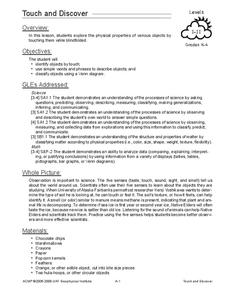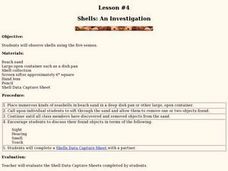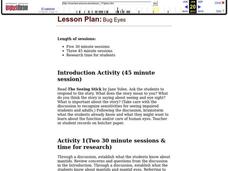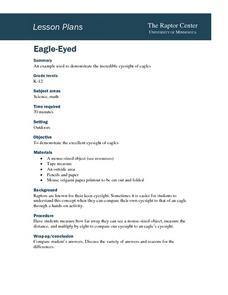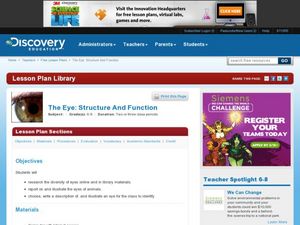University of Minnesota
Attention and Sensory Processing
Ever wondered how your brain manages all of the information it receives every second of every day? The sights, the sounds, the smells ... each one filed away for later use or moved to the front of the line so your body can react. Through...
K20 LEARN
Sweet and Savory Writing: Descriptive Writing
The engagement is in the details. Young scholars learn the benefit of weaving descriptive and sensory details into the fabric of their writing through the activities in this lesson. As their hands explore items concealed in bags, a...
K20 LEARN
The Eyes of Dr. T. J. Eckleburg: The Great Gatsby and the Sense of Sight
To conclude a study of The Great Gatsby, class members create a multimodal project that represents what they feel the eyes of Dr. T.J. Eckleburg see about the hidden side of one of the characters in F. Scott Fitzgerald's classic novel....
Curated OER
Touch and Discover
Students identify the physical properties of items using the sense of touch. For this touch and discover lesson, students describe items. Students sort items using a Venn diagram.
Curated OER
Shells: An Investigation
Students observe shells using their five senses. In this scientific inquiry lesson, students examine shells using a hand lens and their five senses. Students complete an included shell data sheet.
Curated OER
Understanding Eyeglasses
Kids wonder about eyeglasses, and why people have to wear eyeglasses. This should shed some light on the subject. Learners develop an understanding about eyelgasses, and also other visual aids, such as magnifying glasses. In fact, they...
Curated OER
Visions for Students: A Study of British Ghost Stories
Ghost stories are the hook suggested in this proposed unit to engage reluctant readers.
Curated OER
Superhumans & Bionics; Electronic Eyes
Learners examine the anatomy of the eye and the physiology of vision. Students participate in a modeling activity to demonstrate the difference between a healthy eye and an eye affected by macular degeneration. Learners match part of...
Curated OER
An Eye on Science
Students investigate the human eye and its parts. They read and discuss various books about eyes and sight, draw a rough draft of an eye diagram, and create a final draft of their eye diagram including labeled parts using Kid Pix...
Curated OER
Bug Eyes
Students explore mantid eyes and human eyes. In this mantid eyes and human eyes research lesson, students work in small groups to gather information. Students read books, observe mantids, and do experiments. Students then present their...
Curated OER
Sense-Ability
Students use comparisons, graphing, patterning, and sorting, and develop language skills as they explore the five senses.
ARKive
Nocturnal Animals
How do those nocturnal animals see in the dark? This perplexing question does have an answer. First, little ones use their sense of touch to determine the name of a mystery object, then they listen closely to identify various animals by...
Curated OER
In Touch with Apples
Students read "How To Make an Apple Pie and See the World", the story of a girl who traveled the world to find the ingredients to make her apple pie. They conduct a series of interdisciplinary activities including testing their senses,...
School District No. 71
Adding Written Detail: Using Jane Yolen’s Owl Moon as a Mentor Text
Access your senses with a worksheet on sensory language. Based on Owl Moon by Jane Yolen, the worksheet prompts kids to find examples of each of the five senses, as well as phrases for inner emotion.
Curated OER
Exploring Learned and Innate Behavior
Middle schoolers explore the differences between learned and innate behavior among humans and monkeys. They complete an assignment and read articles about two studies, which used similar test methods to show that infants and monkeys...
Curated OER
You Won't Believe Your Eyes!
Students gain a basic understanding of the sense of sight. They watch a video on sight, then engage in some vocabulary games, and perform some simple experiments which focus on the basics of sight.
Curated OER
Growing Eyeballs
Pupils investigate vision and the anatomy of the human eye. They complete a Webquest, watch a video about the structure of the eye, take an online quiz, answer discussion questions, and read newspaper articles about activities that...
Curated OER
Eagle-Eyed
Young scholars study the eyesight of eagles. They discuss raptors and their eyesight and compare it to their own. They measure how far away they can see a small object and its distance. They calculate the eyesight to measure an eagle's...
Curated OER
Mechanism of Our Eyes
Students study the eye as the organ of vision, They look at a drawing of the eyes and study the names of the parts. While working with a partner, they observe what happens when the lights are turned lower and lower. Finally, they look at...
Curated OER
Sound for Sight
Students study echolocation and understand how dolphins use it to locate prey, escape predators, and navigate their environment. They view a video, "In the Wild-Dolphins with Robin Williams" and see first hand how dolphins communicate. ...
Curated OER
Would You Believe Your Eyes?
Students study the parts and functions of the human eye. They create dodecagons which are twelve-sided figures with twelve equal angles and share these with the class so that each student can begin to see how many different illusions can...
Curated OER
The Eye; Structure and Function
Students research the structure and function of the eye. In this anatomy lesson, students write a report about the eye and draw an illustration. They research a particular animal's eye then present their findings to the class without...
Curated OER
Make Sense of Nature
Learners participate in this program that heightens their awareness and curiosity of nature as well as their sense of adventure and exploring new surroundings. They identify and choose an object from nature after exploring it with other...
Curated OER
Cloze Passage: Our Sense of Sight
In this cloze worksheet, students read a passage and fill in blanks with words from a word list. The passage is about the sense of sight.





